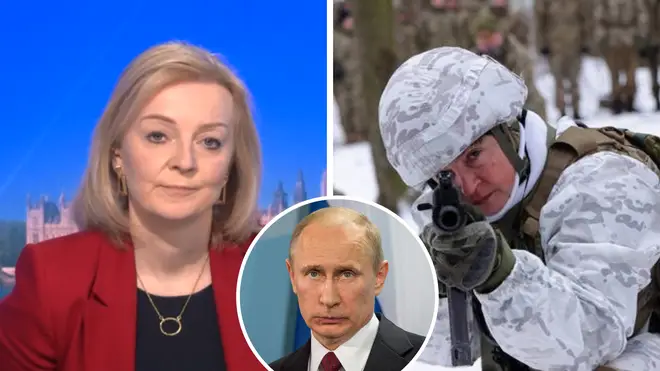
Paul Brand 10am - 12pm
26 January 2022, 09:16 | Updated: 29 January 2022, 12:43

The Foreign Secretary has said the UK is ready to impose "severe" sanctions on Russia, as tensions increase on the Ukraine border.
Speaking to Nick Ferrari at Breakfast, Liz Truss said the UK's economic sanctions are "ready to go" warning "even more severe" sanctions will approved imminently.
The MP for South West Norfolk said: "We need to deter Putin from an incursion into Ukraine and what we are doing is supplying defensive weapons to Ukraine, the UK is leading on that.
"We are also putting in place a very strong package of economic sanctions so that Vladimir Putin understands there will be a severe cost if he stages an incursion into Ukraine.
"And we are working with allies to reduce dependence on Russian gas across Europe to make sure there is less pressure on other European nations."
The Foreign Secretary noted that 800 UK troops are currently deployed in Estonia, adding that Britain had sent Ukraine anti-tank weapons.

Truss: West needs to deter Russia from invading Ukraine
Read more: Russia's sons won't come home if they invade Ukraine: Boris issues stark warning to Putin
Read more: Putin must 'step back' from war and free world will 'stand its ground'
When questioned over how fast sanctions can be imposed, Ms Truss replied: "We are ready to go on sanctions and we are also legislating for even more severe sanctions very shortly.
"We are coordinating with our allies, but of course we need to make sure everyone is ready to put those sanctions in place.
"What we are saying to Putin is, this is not going to be easy for Russia, we know the Ukrainians will fight, they have a strong supply of defensive weapons, the UK has helped train up 20,000 troops in Ukraine.
"And this would result in a quagmire. The Russians need to be aware that this is not going to be simple or easy."

What's the difference between a Russian invasion and incursion
Read more: Seven Dwarfs may be axed from Snow White remake amid Disney backlash over 'stereotypes'
Read more: Father charged with murder after 19-year-old daughter 'hit by a car'
Boris Johnson warned on Tuesday that many of Russia's soldiers "won't come home" if they invade Ukraine, as he stressed the UK "won't hesitate" to toughen its sanctions against Russia.
Speaking in the House of Commons amid the partygate scandal, the Prime Minister told MPs he "shudders to contemplate the tragedy that would ensue" if Russia sends troops to Ukraine.
In a stark warning to families amid rising fears of a possible military invasion, Mr Johnson said: "If Russia pursues this path then many Russian mother's sons will not be coming home."
He said the Russian military build-up is "a spectacle that we hoped had been banished from our continent", comprising of over 100,000 troops - far bigger than anything Russia has deployed against Ukraine before.

Ex-Defence Secretary speaks on Russian aggression against Ukraine
Read more: Boris Johnson was 'ambushed with a cake', says Tory MP amid birthday bash row
Read more: Russia's sons won't come home if they invade Ukraine: Boris issues stark warning to Putin
"If the worst happens, and the destructive firepower of the Russian army were to engulf Ukraine's towns and cities I shudder to contemplate the tragedy that would ensue," Mr Johnson told MPs.
"Ukrainians have every moral and legal right to defend their country and I believe their resistance would be dogged and tenacious, and the bloodshed comparable to the first war in Chechnya or Bosnia, or any other conflict that Europe has endured since 1945.
"No one would gain from such a catastrophe."
It came as US president Joe Biden said he would consider personal sanctions on Putin if Russia invaded Ukraine, making it clear to Moscow that there would be a price to pay.
Ukrainian defence minister Oleksii Reznikov said that on Monday Russia's armed forces had not formed battle groups, which would have indicated an imminent attack.
However the Ukrainian government acknowledged the threat from Russia, and Mr Reznikov said that, whilst not expected in the next day, an attack is "possible and probable in the future".